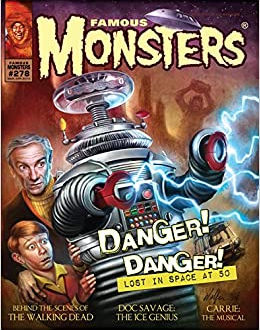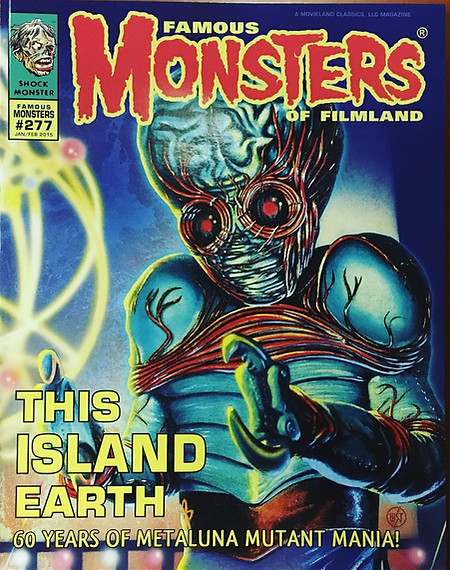An Interview with Philip Kim: Keeper of the Flame at Famous Monsters of Filmland
by Lee Sobel (8/28/20)

62 years ago in February, 1958, a new magazine was launched by publisher James Warren and editor Forrest J. Ackerman called Famous Monsters of Filmland and was read devoutly by such "monster kids" as Stephen King, Stephen Spielberg, Joe Dante and many others. The magazine was loaded with photos from old horror movies with Ackerman providing the punny captions and the heyday of Famous Monsters was the 1960's. In the 70's the magazine lapsed into reprinting a lot of material from earlier issues and by the early 80's James Warren pulled the plug on the magazine. From there the history of the magazine gets convoluted. It resumed publication in the 90's but in 2009 there was a court case that was resolved with the trademark for the magazine going to entrepreneur Philip Kim whose one regret was that Forry Ackerman passed away in 2008. Kim has done a great job of keeping Famous Monsters alive and retaining the look of the classic magazine.
Lee Sobel: What kinds of things do you remember from your childhood that may have led up to your now being the publisher of Famous Monsters magazine?
Philip Kim: My family immigrated to the United States in 1976. Korean TV and cinema was still in the 50's if you measured it by US standards. My

parents both worked and I instantly fit into the latch key culture. So my best friend and babysitter was a black and white cathode ray tube 9" TV...a screen smaller than a tablet. It was a Zenith and had an analog dial that made a clunking noise when channel surfing the seven or so channels that were available. Like a first time drug experience I was introduced to Twilight Zone, Night Gallery and Creature Features. Since we lived in the San Fran Bay Area, I was treated to a local Japanese station that aired Japanese cartoons like Raiden and Mazinger over UHF on channel 26 on Sundays. Yes, I was forever ruined with the imprint that has become Comic Con culture at a very young age. There should have been laws to protect minors, lol. I soon found myself searching for anything and everything fantasy, Sci-Fi and Horror in libraries, book stores and grocery stores. Let me tell you, there is nothing, nothing that will replace the smell of paper and ink, old and new. As Forry Ackerman coined, "Sci-Fi" was my high.
Lee Sobel: Did you ever see yourself getting into publishing? Prior to Famous Monsters you also produced and directed movies. Is that something you look forward to getting back to? What can you tell me about your movie making?
Philip Kim: I never imagined myself as a publisher. It was just never anything I thought of. But once you get print in your blood it's hard to walk away from. I really enjoyed it and perhaps I will do it again someday when we have come out of this COVID Madness. I did however dream dreams of becoming an actor, producer or creator of some sort. It was all I ever wanted to do and I got to do that in a small way. I executive produced Radio Free Albemuth, Philip K Dick's last published book adaptation of Valis. Then I went on to write and produce Downstream, a post apocalyptic film.
Lee Sobel: Did you get to know Forry Ackerman when he was alive?
Philip Kim: Yes, of course. I took over FM two years before his passing. He blessed the relaunch and signed on as honorary Editor and Chief. He is missed.
Lee Sobel: When you took over publishing FM, did you have any ideas to make the magazine more contemporary or did you just want to retain what the original magazine was like?


Philip Kim: It was a puzzle. We had to retain a legacy that was based on a man that was legendary with his perspectives and puns. The magazine was his essence on paper, ink and binding. It was not easy but we turned it into a tribute to him and those that were forever changed by his kindness, generosity and childlike optimism about humanity and its future. Let me tell you, he died disappointed on that hope. I believe we did the best job anyone could on relaunching FM and it was successful but it was never going to be again, the glowing orb of Forry's mind that held all the hopes of a better future because nothing will be as good as we imagine them to be.
Lee Sobel: What are the ages of the majority of readers of FM these days? I imagine there must be a lot of older people who enjoy the nostalgia aspect of seeing the magazine still going.
Philip Kim: FM is one of the few brands that are so loved by all ages that when we are
at live events we will see three generations in a single family come to celebrate the past present and the future. It's a sight to behold. My team and I are proud of our contribution to FM history.
Lee Sobel: What would you say are some of



the things about taking over FM that have been especially satisfying for you? Are there any things about taking over FM that were frustrations or disappointments for you?
Philip Kim: This is a hard question. I don't think I was ever satisfied as I look back at any issue and think to myself, "It could have been a little better." This was never from lack of trying. Each issue was a blank canvas and that was our asset and our greatest liability all at once.
Lee Sobel: What is it about FM that has enabled it to sustain and find appreciation from new generations to keep it going all these years?
Philip Kim: I'm asked this question often and I can give you a definitive answer that is applicable to all things on this planet without exception. FM started out with an undying love that Forry had for cinema and all things fantastical. He was rejected by his father and brother for being a freak. He was taken advantage of by those that could. People dismissed him because they didn't understand him. FM was born out of conviction. A conviction of love and not of hate. FM was the manifestation of Forry's pure heart. We have morphed into a culture that doesn't really practice this anymore. Our greatest thoughts are displayed in a meme or a 140 character flow of consciousness. Profits over people is the love of the day. This is why future generations will need the past more than ever to remember what it was like before Google and Facebook.
Lee Sobel: What new projects are you getting into?
Philip Kim: I am waiting to see what the post COVID 19 world will need. I have many, many ideas. Whatever they are it will be to Entertain, Educate and Enlighten. We only have so much time on this planet, don't need to have regrets in the end.
The End.

